Woman Power and Small Farm Success
Air Date: Week of July 31, 2015
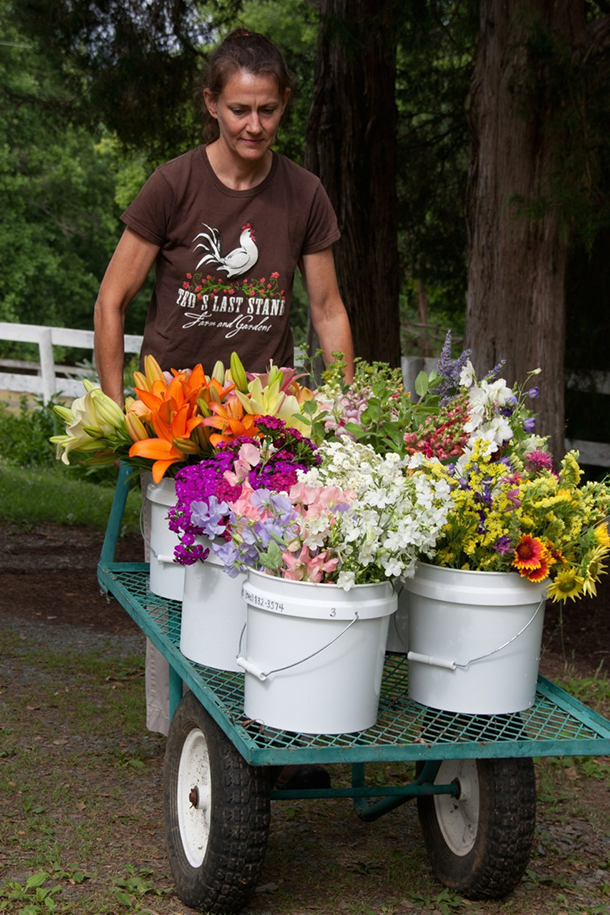
Audrey Levatino grows specialty cut flowers and sells them at local farmers’ markets to florists and restaurants, and for weddings. (Photo: Michael Levatino)
Women are increasingly joining the "back to the land" and local food movements as farmers. Host Steve Curwood spoke with farmer and author Audrey Levatino, who has written Woman Powered Farm: Manual for a Self-Sufficient Lifestyle from Homestead to Field. Her book is for anyone who would like to start farming, with special hints for women and anyone wants sustainable and back-saving approaches to the rigors and joys of tending life on good dirt.
Transcript
CURWOOD: It's Living on Earth. I'm Steve Curwood. It’s the busy season for small farmers all across America – when fresh produce at its peak must be harvested daily for the local farmers’ markets. And while women are usually the farmers in traditional societies, it’s a male dominated business in the US. But women are coming on strong these days, especially raising and selling local homegrown vegetables and flowers and jellies and chutneys.
One such farmer is Audrey Levatino, who has written a handbook for anyone seeking to grow local called "Woman-Powered Farm: A Manual for a Self-Sufficient Lifestyle from Homestead to Field”. Well, we thought this might appeal to anyone who fancies a bit of manual labor – so we called her up. Audrey, welcome to Living on Earth.
LEVATINO: Well, thank you so much. It's great to be here.
CURWOOD: So, why did you decide to write a book about farming specifically for women?
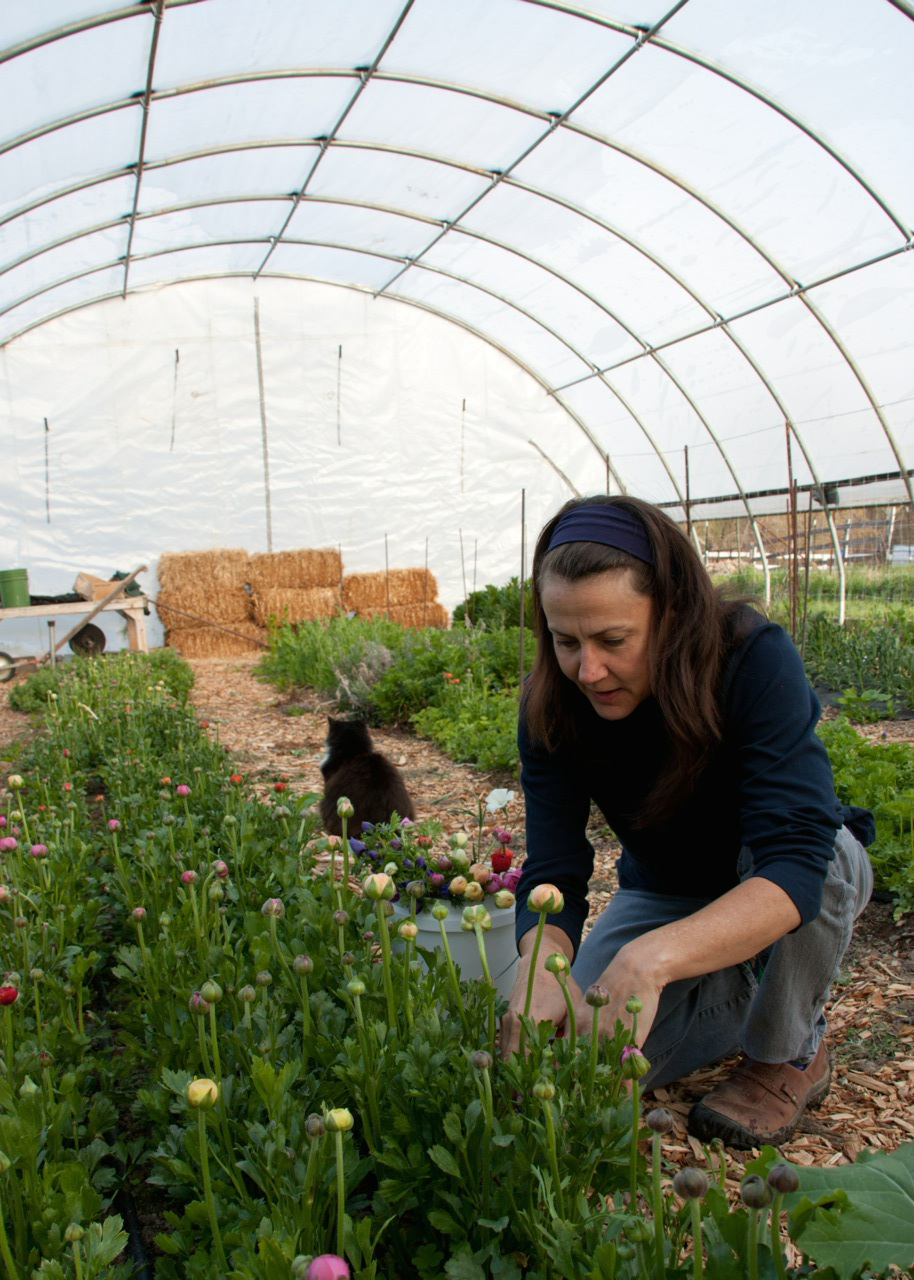
Audrey Levatino is the author of Woman-Powered Farm: Manual for a Self-Sufficient Lifestyle from Homestead to Field. With help from her husband Michael at the start, Audrey now grows numerous specialty cut flowers on their Virginia farm, Ted’s Last Stand. (Photo: Michael Levatino)
LEVATINO: Well, women were coming up to me at the farmers’ market and asking about what I did and were very interested. Many of them wanted to know how to get into farming and growing things themselves, and so they wanted advice and instructions on how to get started. Then I thought, most of these people are women around my age or younger, and when I first started out there wasn't just one book for a lot of the information that I wanted...I had piles and stacks of books. I started thinking about gathering all this information into one resource, a book just for women that addresses the concerns and interests that women farmers have.
CURWOOD: So what are the unique challenges that women farmers face as opposed to guys?
LEVATINO: Well, a lot of it is physical body strength. Men are built different than women so there's definitely going to be a bit of a different approach in terms of facing heavy-duty tasks. We really need to approach tasks with more creativity about how we can use our lower body strength and spare ourselves from injury, perhaps using wheels whenever we can instead of lifting up heavy buckets and carrying them, put them on a garden cart and wheel them over to where they need to be. There are many companies coming out with tools specifically designed for women to use. There's a shovel called HERShovel™ that has a wider foot base; you can get both your feet on there and really get some leverage and it has totally curved hook handles, you can get both hands and grip. There's an easy start chainsaw that's a little bit lighter weight and it doesn't take that really strong pulling motion, easy hitch and unhitch implements for tractors because that's really the biggest deal with using a tractor is getting those implements attached to the tractor - that's where the strength comes in, driving, anyone can drive something right? I hope. [LAUGHS]
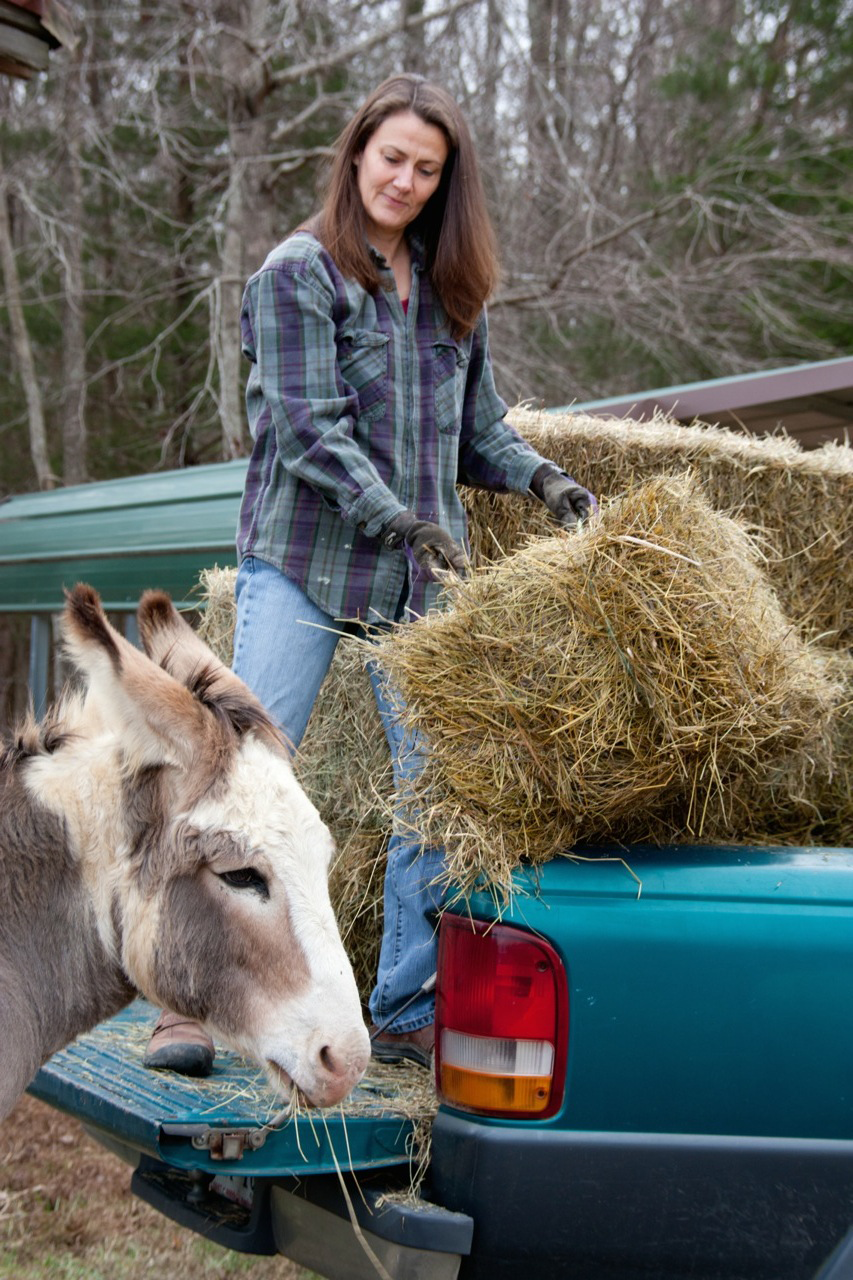
Whipper, one of two “gregarious” donkeys on Audrey’s farm, munches on some hay as Audrey unloads bales from the back of a truck. (Photo: Michael Levatino)
CURWOOD: Yes, but those attachments certainly can really weigh...in fact you have an interesting trick in your book, you say get a big iron crowbar to deal with attachments.
LEVATINO: Absolutely, I mean use that leverage! Again, I have another wonderful garden tool, the broad fork, and that's all about leverage. Use gravity whenever you can, make gravity work for you rather than against you.
CURWOOD: Audrey, what do women farm more typically as opposed to men?
LEVATINO: That's a great question, and that's another thing that I really investigated when I was writing the book and many women get into this farming business. It starts off as just wanting to provide the best and healthiest, most local food that they can for their families. So women are growing a lot of different things, but in many cases it is healthy, delicious, seasonal food. They know exactly where it came from, so that their children and their husbands and their neighbors can have the best food possible.
But the other thing that I discovered as I got further into my research and interviewed lots of women farmers in my area and around the country is women are just amazingly creative: they grow herbs and other medicinal plants to make cheese, salves and tinctures. Women also tend to farm, when they do livestock, smaller animals. You know, things that are a little more manageable and sometimes it's for fiber - sheep and llamas and alpacas - other times it’s for milk such as using goats to make cheese. So it's not just one specific thing.

Farming, Audrey says, isn’t just about doing the physical labor of growing and harvesting a crop; it also involves understanding the local market for the product. (Photo: Michael Levatino)
CURWOOD: Now, you write that many women have particular qualities that lend themselves well for farming. What do you mean by that?
LEVATINO: I myself don't have children but I interviewed many women farmers who do have children, and a common analogy that would come up when they were talking about being a farmer and the work of farming was having children. One of the qualities that women have, most women, is being very nurturing, and that's a big part of farming, not just for livestock but also for your plants and vegetables and paying attention and noticing when something starts to go wrong. Women are very good at having that sixth sense of: “that's not quite right” and being able to catch diseases and bug infestations sooner rather than later, and I'm not saying that men aren't good at that but that's just something that I noticed in talking to women that came up quite a bit. They're also willing to keep trying, and I think again these are qualities that men have, but I think in women it really is a huge benefit in farming to just keep trying again. If something doesn't work you're going to try something else.
CURWOOD: Audrey, paint a picture for us. What's a typical day like on your farm?
LEVATINO: Well, most farmers - I think this is universal - get up very early. You've got to get things done first thing in the morning. You've got to get up and feed those animals, let them out into pasture, water them - that's your first-order business - and if you're a plant farmer like myself - I grow mostly cut flowers - after I've fed my chickens, let them out of their coops, I go out and harvest. I spend my earliest coolest hours out in my flower fields harvesting flowers into buckets of water and I'll spend about two to three hours doing that in the morning and then I'll come in and take a break and eat some breakfast, check my e-mail, see if anybody has ordered more flowers, where do I need to go, what deliveries do I need to set up and then I go back out to the field.
The next order of business after harvesting is doing a thorough walk about—checking for bugs, eggs, on the leaves, aphids, any sort of disease that might be occurring in Virginia. We have a lot of humidity so rot can set in, and so I'm scooping bugs into water and feeding them to the chickens and then planting—getting in your next crop. If a crop needs to go in, then I need to prepare the row, put down landscape fabric if that's what needs to be done, get any crops planted for my next succession, and then weeding. That always falls to the bottom of the list and sometimes it doesn't get done, and sometimes if I have the time, social media, getting on and posting something on Facebook, putting something new on the website. But that also tends to get pushed down the list quite a ways.
CURWOOD: Audrey, why do you cultivate mostly flowers?
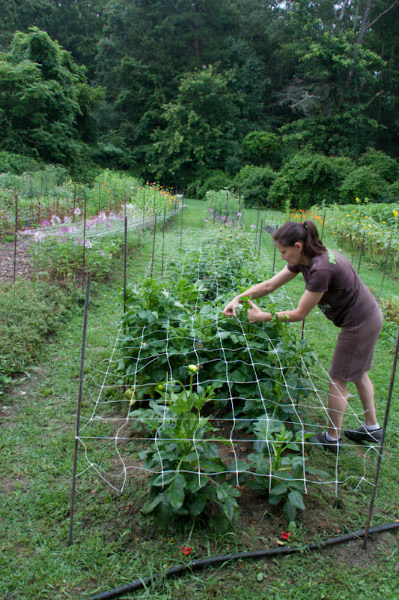
Audrey says she decided to cultivate flowers because she loves the bees they attract to her farm and the joy they bring to admiring customers at the farmers’ market. (Photo: Michael Levatino)
LEVATINO: I've always loved flowers and I got interested in it when I first started off with a vegetable garden. When I decided to make farming more of a full-time occupation, I looked around and was thinking about what might my market need. What would I enjoy doing? I love color and so I decided on flowers and just researched and started off small. Flowers, for one thing, they attract pollinators, and I really love having the bees and all of the butterflies and the birds. When you have as many flowers as I do, that's just constant, and it's wonderful, and also flowers make people happy. I love to see the smiles on people's faces when they see the flowers and just the joy that flowers bring to people.
CURWOOD: So tell me about some of these flowers you grow. What different kinds?
LEVATINO: It's all seasonal. I grow most of the stuff myself, starting from seed, and I grow things like Ranunculus, Anemones, Delphinium, Chinese Forget-me-nots, Canterbury bells, Matthiola...all of those are really nice spring crops that like to get started in cool weather and once it gets hot - once it gets up to like 85 degrees - they're not very happy so they stop blooming. I have two unheated covered structures, which are called either high tunnels or hoop houses. They're just basically big metal hoops with greenhouse plastic over them that are all covered up in the winter and then you roll the sites up in the summer so that the air can get in and cool things off. And that allows me to start some really beautiful spring crops early, so that I can have some cool weather crops, and then I move on into the summery crops -- of course I have Zinnias and sunflowers and Gladiola, Queen Anne's lace, Rudbeckia, of course Larkspur. As summer goes on, the Dahlias start blooming, which are always very popular. I get Euphorbia Kilimanjaro, which is this green and white flower, which is lovely. So it's very seasonal but to try and keep enough variety in there, so that I can make bouquets and fill orders for weddings that require a little more diversity.
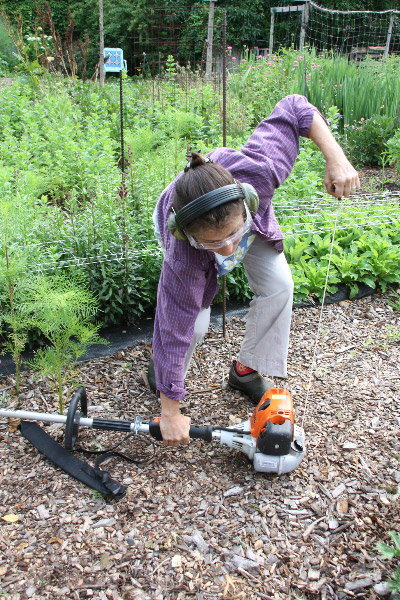
Audrey starts up a weedwhacker, determined to make a dent in the ever-encroaching weeds that threaten to crowd out her flowers. (Photo: Michael Levatino)
CURWOOD: Now, you didn't have much of a farming background when you started. How did you learn the skills that you needed to run your farm?
LEVATINO: I'm very much trial and error and go out and figure it out yourself, which means that I made a lot of mistakes and that was another reason I wanted to write this book and share it with people. Also I learned a lot from books, workshops; -- the agricultural extension agencies in state through your universities have wonderful workshops and programs that can introduce you to things - that's how I learned about bees. I took a class through my agricultural extension agency and started beekeeping. Take advantage of the resources that are out there that are, for the most part, free or very inexpensive. And the main resource that I would say any farmer needs is other farmers. You've got to go out there and find people in the community that are interested in what you're interested in that have been farming and that can be mentors because you're going to need help and that community of farmers is going to be a really strong support system for you.
CURWOOD: You write about one of your lessons in your book. You mostly do flowers but you also have donkeys and there is a story about the donkeys. Tell us the story.
LEVATINO: Well, first of all, we have about nine acres of pasture, and so when we first moved in and we felt like we really needed some grazing animals, the people who had owned the land before us had had horses. Horses are very high maintenance animals. Donkeys are about the lowest maintenance animal you can own, and they're also very cute and very gregarious. They are like having a couple of 350-pound unruly dogs. So we got the donkeys and just loved them.
All of our pasture is surrounded by woods, and we get windstorms and lightning. And the trees get old, and limbs break off, so the fence needs to be under constant surveillance. You've got to do the walking the perimeter and I let that slip and one morning I realized...we have one donkey that's very vocal and he didn't make the noises he usually makes when a car starts up on our road and so when I went out to look for him, I found a breach in the fence and the story is about being unprepared for that circumstance and how I ended up dealing with it, and part of that was really relying on the community - neighbors and farmers and friends. But it was also a lesson in making sure that your fence is always in good repair.
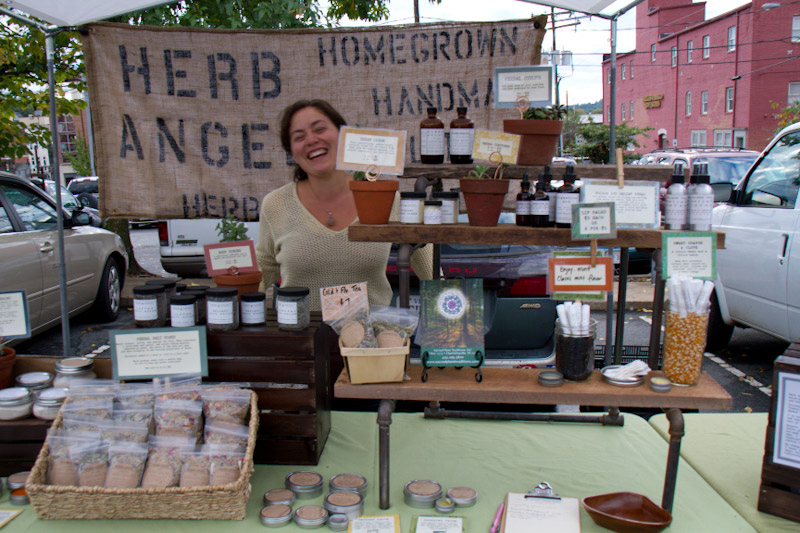
Angel Shockley, one of the women farmers Audrey profiles in her book, makes and sells herbs, teas, tinctures, and salves through her business, Herb Angel. (Photo: Michael Levatino)
CURWOOD: Indeed, mending fences is important, including with your neighbors. What did these donkeys do when they got out as far as your neighbors were concerned?
LEVATINO: [LAUGHS] Well, when I first reported it to animal control I said, I'm missing a couple of donkeys...they got out, and if anyone sees them can you let me know? About an hour later he called me back and apparently -- in quotations –“two white horses had been seen procreating in somebody else's yard”. And so that was the first sighting of the errant, wayward donkeys.
CURWOOD: [LAUGHS]
LEVATINO: And they're half-brothers and they just mess around like dogs, kind of mounting each other and wrestling, so this was quite embarrassing and also amusing really after-the-fact.
CURWOOD: So what was the biggest surprise that you encountered, as you went into farming and then went on to write this book to encourage more women to farm?
LEVATINO: When I first started out farming, my husband - he's had the same job but he wasn't quite as busy with that job - and so she was available to help me with a lot of things and that's how I learned how to do these chores, like using the chainsaw, and driving the tractor and cleaning the chimney. When he wasn't able to help me anymore I realized, wow, this is really, really hard work.
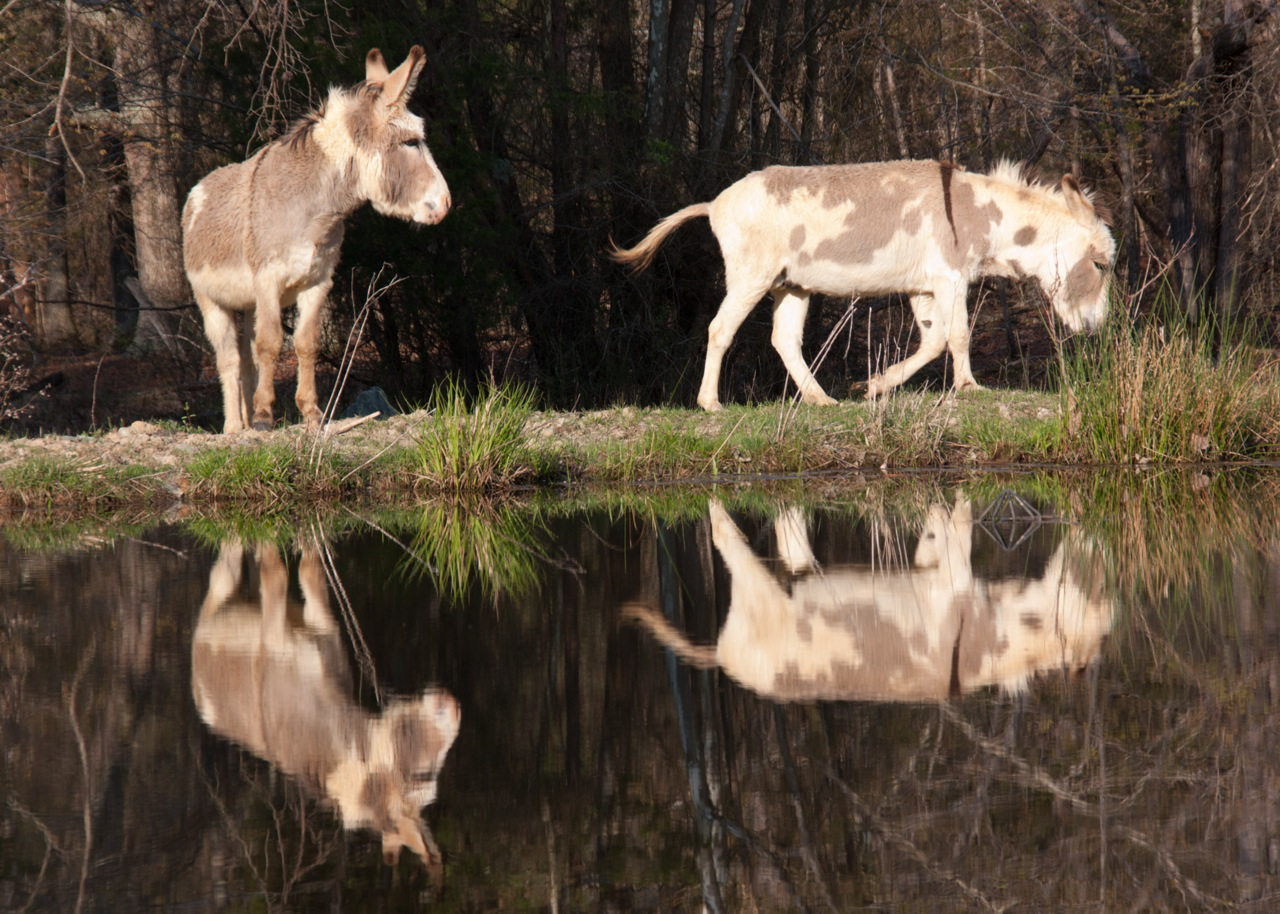
In a section of her book titled “The Great Donkey Escape,” Audrey details the story of how her donkeys, half-brothers Tyler and Whipper, escaped through the fence one day. Audrey found the donkeys later that day, but not before a neighbor noticed the brothers playing one of their favorite games—mounting each other. (Photo: Michael Levatino)
Being a farmer is really tough. You have to be self-motivating, have your own business plan, so it's not just doing the farm work, it's doing the accounting and planning out your succession plantings and your crops for the year and not just one year maybe two years and having an alternate plan because there's always to be a weather incident or some sort of crop failure or a market's going to fall through and you have to know your market, you have to do the research, you have to stay innovative and on top of the game, so I think I underestimated how many hats I would have to wear to actually make this job and make my business a success.
The other surprise was really just how much you end up loving it and being committed to it and having this fellowship and community feeling with other people that are in the same type of work and how that really builds a sense of belonging that I hadn't felt in this community before.
CURWOOD: Audrey, for whom did you write this book?
LEVATINO: Well, I wrote it to encourage and help inform women that are thinking about going into farming, but aren't quite sure or are hesitant about whether they think they're capable of doing it so it's really just a book that's for encouraging people to take that step. If you think you want to farm something, if you think you want to have a garden, if you think you want to start raising livestock, do it, take a chance. Of course, go out and explore and learn how to do it and then trust yourself.
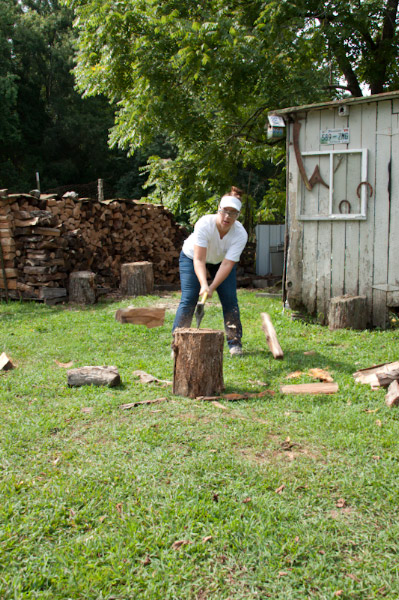
Woman-Powered Farm includes how-to spreads on essential farming skills, such as chopping firewood, that take into account the particular abilities of women. (Photo: Michael Levatino)
CURWOOD: Well, for anyone who’s listening to us talk and is curious about farming, there's quite a bit of real practical information about what you need to do to get going on a small organic hand-raising scale. If you want to go into commodities soybeans probably this is not the book for you. So last question, why did you pick this approach? You know that the vast majority of agriculture in this country is done on the industrial scale.
LEVATINO: Right. Right. Well and again that is a trend that women are leading the change in that by having these smaller independent farms that raise specialty crops and niche crops and are getting away from that idea of Big Ag. Big Ag is certainly important, we've got a lot of people in this country and other countries to feed, but getting closer to the land and really raising food and taking care of the planet that the food comes from is part of that movement that I think women are in the forefront of. So I wanted my farm to grow just as organically as everything else does. Basically I've created quite a little sustainable ecosystem: I have a pond, I have a mushroom grove, I've got the bees. So trying to create a balance in the nature on my property where everything works together and helps each other and is interdependent. I think and I hope that it's just again that nurturing attitude which is taking care of the Earth, as well as taking care of the people on the Earth.
CURWOOD: Audrey Levatino is author of "Woman-Powered Farm: A Manual for a Self-Sufficient Lifestyle from Homestead to Field”, and farmer of Ted's Last Stand Farm and Gardens. Audrey, thanks so much for taking the time with us today.
LEVATINO: Thank you.
Links
The Women, Food & Agriculture Network (WFAN)
About the USDA’s Extension program provides farming education and resources
Living on Earth wants to hear from you!
Living on Earth
62 Calef Highway, Suite 212
Lee, NH 03861
Telephone: 617-287-4121
E-mail: comments@loe.org
Newsletter [Click here]
Donate to Living on Earth!
Living on Earth is an independent media program and relies entirely on contributions from listeners and institutions supporting public service. Please donate now to preserve an independent environmental voice.
NewsletterLiving on Earth offers a weekly delivery of the show's rundown to your mailbox. Sign up for our newsletter today!
 Sailors For The Sea: Be the change you want to sea.
Sailors For The Sea: Be the change you want to sea.
 The Grantham Foundation for the Protection of the Environment: Committed to protecting and improving the health of the global environment.
The Grantham Foundation for the Protection of the Environment: Committed to protecting and improving the health of the global environment.
 Contribute to Living on Earth and receive, as our gift to you, an archival print of one of Mark Seth Lender's extraordinary wildlife photographs. Follow the link to see Mark's current collection of photographs.
Contribute to Living on Earth and receive, as our gift to you, an archival print of one of Mark Seth Lender's extraordinary wildlife photographs. Follow the link to see Mark's current collection of photographs.
 Buy a signed copy of Mark Seth Lender's book Smeagull the Seagull & support Living on Earth
Buy a signed copy of Mark Seth Lender's book Smeagull the Seagull & support Living on Earth

